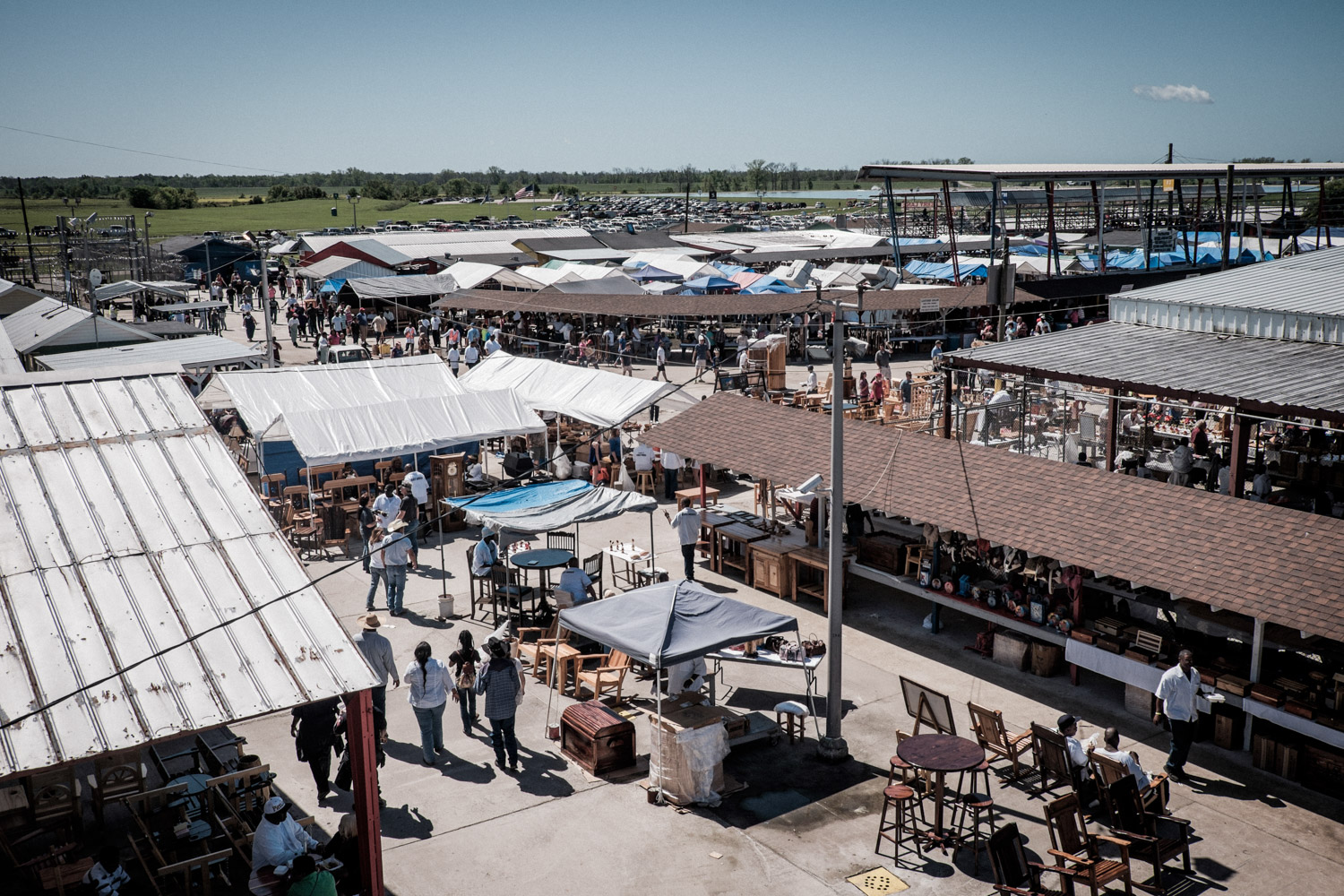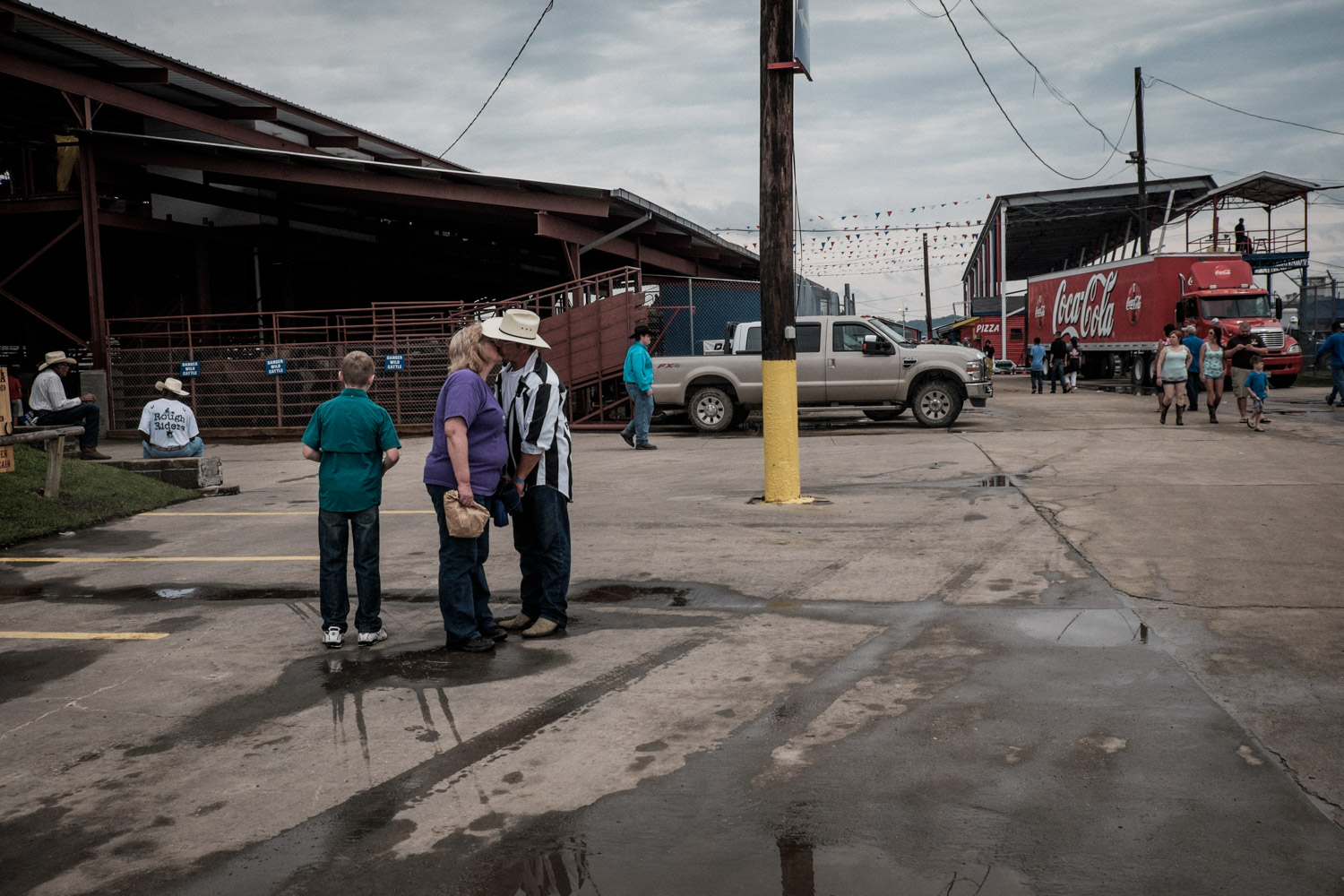Panem et Circences
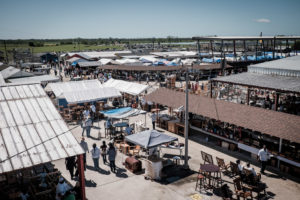
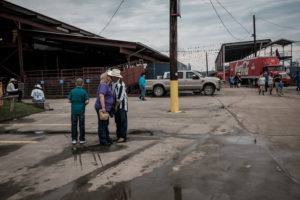
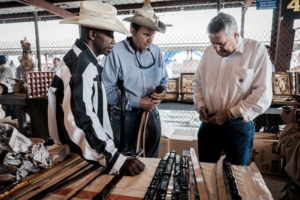
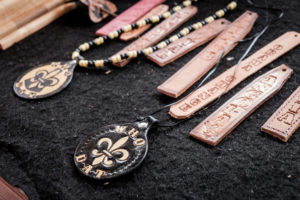
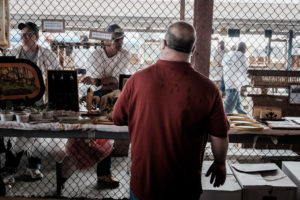
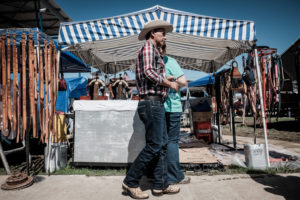
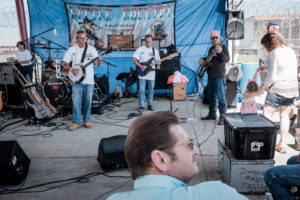
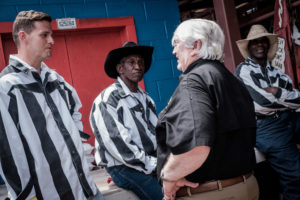
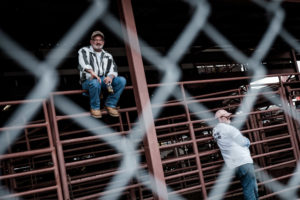
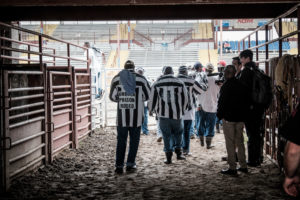
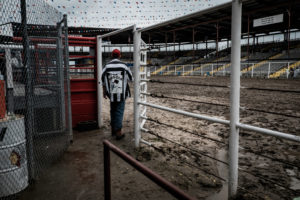
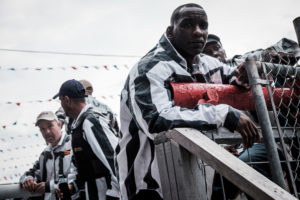
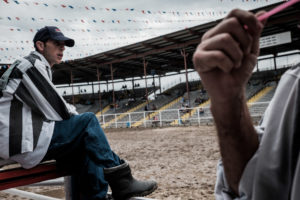
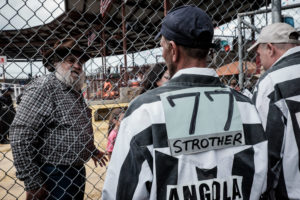
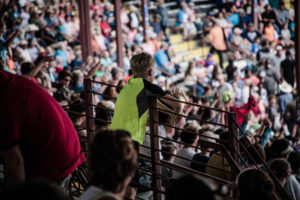
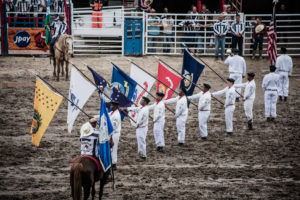
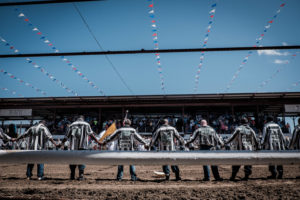
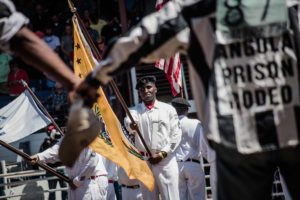
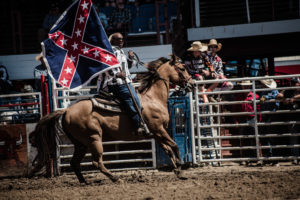
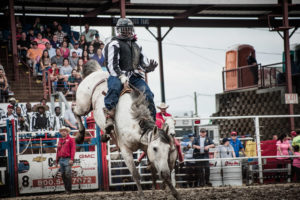
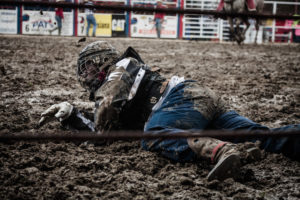
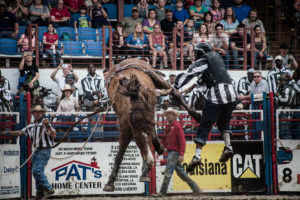
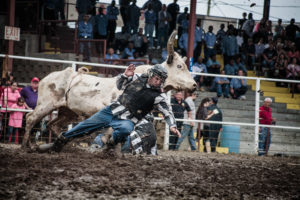
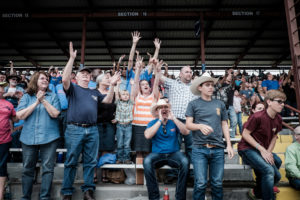
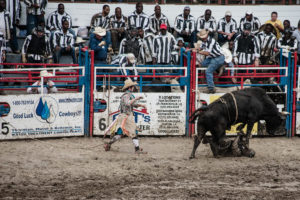
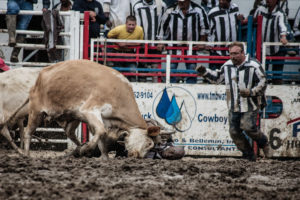
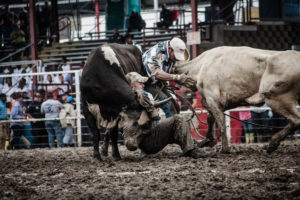
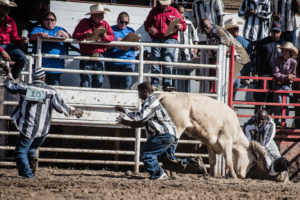
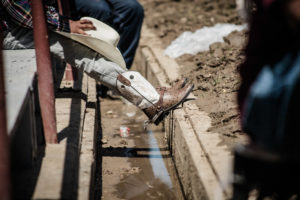
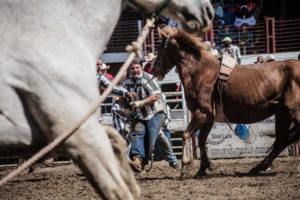
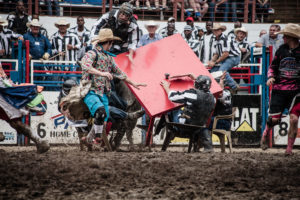
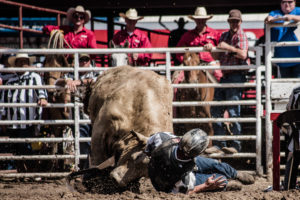
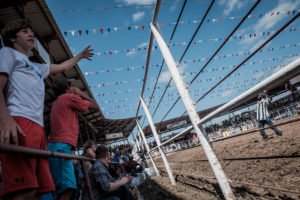
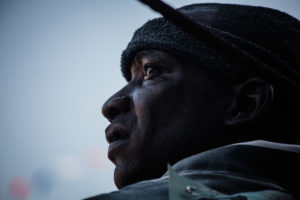
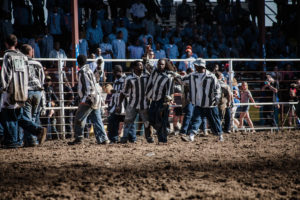
The space open to the public and where the detainees sell their hobbycraft.
A prisonner briefly kisses his wife, in the courtyard of the Angola prison, during the spring rodeo.
A visitors tries a crocodile skin belt, that a prisonner made.
An example of hoobycraft made by the prisonners. They have to buy all the supplies.
Most prisonners don't have the "Trustee" status and have to sell their hobbycraft from behind a wire fence.
A visitor walks between the hobbycraft stands, during the rodeo at Angola penitentiary.
A country music band, formed by inmates, play at the Angola Rodeo.
Warden Burl Cain speaks with inmates before the start of the rodeo at Angola Prison.
Two inmates who look after the animals, before the start of the rodeo at Angola prison
Inmates participating in the rodeo walk to their rows where they'll be counted and briefed.
An inmate walks into the arena, before the rodeo at Angola prison.
Chris G., inmate for life, has won three times the Guts and Glory. He has used to the money to pay for his paralegal studies.
Two inmates wait for the beginning of the rodeo, at Angola prison.
An inmate speaks with a visitor, before the start of the Angola Rodeo.
A boy looks the beginning of the Angola Rodeo.
Opening of the first day of the rodeo at Angola prison. The inmates holding the flags are veterans from US army.
Opening of the second day of the rodeo at Angola prison. The inmates pray and hold hands.
Opening of the second day of the rodeo at Angola prison. The inmates holding the flags are veterans from US army.
A "Rough Rider" holds a confederate flag, only the Rough Riders can train in between rodeos.
"Bareback Riding", during the Angola prison Rodeo.
An inmate fell in the mud, during the "Bareback Riding", at the Angola Prison Rodeo.
"Bareback Riding", during the Angola prison Rodeo.
The "Pinball", during the rodeo at Angola Prison.
The public cheers during the rodeo at Angola prison.
Bull Riding, during Angola Prison Rodeo.
Wild "Cow Milking", during Angola prison Rodeo.
Wild "Cow Milking", during Angola prison Rodeo.
Wild "Cow Milking", during Angola prison Rodeo.
A young spectator, during Angola prison rodeo.
The "Wild Horse Race", during Angola prison Rodeo.
The "Convict Poker", the rodeo's trademark part, at Angola prison.
The "Convict Poker", the rodeo's trademark part, at Angola prison.
A young spectator tries to catch a ball thrown by an inmate.
Chris G., during the "Guts & Glory", at Angola Prison Rodeo.
The inmates, after the Guts & Glory, where they have to catch a wood token glued to a bull's forehead.
To the west flows a river, long, wide and muddy. The Mississippi River. To the east lie the Tunica Hills, populated with wild hills bears, coyotes, poisonous snakes, until Saint Francisville, 40 kilometers from here. “This is why we have the nickname of South Alcatraz, because with these natural barriers, the prisoners have no chance if they want to escape” says the diligent George Heard, educator at Louisiana State Penitentiary, known as Angola, at the wheel of his pickup. A nickname that comes from the old days when the largest prison in the United States was a cotton and sugar cane plantation, and prisoners were slaves torn from west Africa.
Today, more than 6,000 men from 17 to 93 years, overwhelmingly African Americans live and work in the six camps spread across 7000 hectares of farmland. For three cents an hour in Angola, one builds its own channels: levees, church windows and cabbage soup, all made by inmates. Here too are raised high Percheron, which power the mounted police of New Orleans, and the watchdogs of the penitentiary which help surveillance. Half wolves, half German Shepherds they have, to listen to George Heard, “the voracity of the wolf and the dog’s recklessness.”
With 75% of sentenced to life and 1.6% on death row, nine out of ten prisoners will never see the free world again. In Louisiana, more than elsewhere “life means life”: life sentences are never revoked. And the institution keeps its boarders to the grave: two detainees cemeteries are adjacent to the golf course overlooking the prison.
The spectacle of the year
That April morning, on the Mississippi, the fog is thick and the drizzle annoying. Yet the ferry that connects the free world to the penitentiary is full. Assembled like in Tetris, a prison van and 4×4 loaded with smiling families and retirees expect plump, in a festive day of jubilation. The doors of the high security prison open at nine o’clock sharp for the first day of spring rodeo. The visitors came to see murderers and rapists spend a dirty fifteen minutes into the arena, and they arrived early to get a place of choice.
Bizarre? Not in this corner of Confederate land. Every year in April and October, the Angola Rodeo is a date not to be missed. It is “the wildest show South” promise posters and banners put up along the road. Local newspapers assure that detainees – who do not have the right to train – “will be projected in all directions” by 2000 pounds bulls. “Everybody should be there: small traders meet their clients, students their teachers, representatives their citizens” says George Heard, enthusiastically.
According to the Warden Burl Cain, the very Christian director of Angola, these days are a way to finance the rehabilitation and education programs. This allows to deserving prisoners to earn some money by competing in the rodeo or selling to tourists their handicrafts cobbled together during the year and at their expense : rocking benches, leather belts or colorful paintings — decades behind bars have grown talents.
Unofficially, it is something else. Since he arrived in the 90s, in a jail known as the bloodiest of the USA, the warden set up a church in every camp and instilled the strict order of religion. His rodeo is a demonstration of redemption offered to the world: former criminals, gladiators in the arena or on duty in snacks, were carefully chosen. They redeemed themselves, at great effort and long prayers, some virginity: they became trustees, trustworthy inmates.
Guts for glory
After arriving at the scene of the festivities in the heart of the penitentiary, it’s the American dream of small confederate cities. The weapons must be left at the entrance, and the crowd is there, variegated. The rodeo starts at 2pm, but people arrive early to haggle tinkering inmates, and the stands selling alligator sausage sandwiches, crayfish and fried Coke -a specialites- already serve customers. In the alleys, inmates / rodeo riders, dressed in a black and white striped uniform, meet families and friends outside the parlor. They cross paths with tourists who bought, for the joke, t-shirts of the same colors. The family of Janice has given appointment at 1pm before the souvenir stand. “We come every year from Morgan City three hours away, we got up at 5 o’clock. It’s fun and there is nothing to fear, bad prisoners are kept in cells.”
In the crowded aisle, a group of young girls in long Mennonite pastel robes and pristine headdresses contemplate silver bracelets made by a prisoner watching them, standing behind a fence. “This one still has no right to be in contact with visitors. Next year, by the grace of God, he will probably be allowed through the barrier”, says Monica Silvester, the bubbly head of educational center. Indeed, one quickly understands, being a trustee is not given to everyone. “You have to have already done more than 10 years and complete a true record. They go before a jury to show they are on the right path but in the end it is the Warden Cain who chooses. He has an eye everywhere and knows everyone here, inmates and employees.”
Before a stand selling fried skin pig, in white shirt and pair of jeans, Sirvoris Sutton smiles. The beefy quadra, held in Angola for 24 years for committing a double murder when he was a kid, has just found his stepson -he pats his head regularly. “When you think about it, it’s a conundrum. We have all done terrible things and we are left with free people. But an opportunity like that, it gives us perspectives: we got up at 4 am to show that we are not animals and we can change. We also want to set an example to youngsters, to do something with their lives and stop the bullshit. “
Convict Poker: the circus games
There is a great burst from the speaker that invites the crowd to sit in the arena of 10,000 seats, built in six months by the prisoners. A hundred uniformed prisoners waited for hours, each with a small picnic: they won the right to attend the show, under guard and behind large gates that separate them from the public.
Before them, the riders cross the muddy track and settle in their section as the clamor rises. They put Kevlar vests and American football helmets. Horns and falls can do damage, ribs break each year, bones are split. Some detainees remained paralyzed, one of them even died of a heart attack in the dust of the track. To avoid this, three ambulances crisscross the arena, ready to pounce. “I stress, but it’s good, it changes the routine, says impatient Joshual Brown, who just turned 42 and 18 years in prison for the murder of his ex-wife. Every year I participate in the rodeo, it gives adrenaline. I prefer the bulls, more powerful but slower. Last year with the horses, I almost didn’t get back up.” Speaking to us, the tall Josh looks at the crowd, maybe his daughter will come to see him this year. Near him, Willie Douglas adjusts his cap printed with a large cross. It’s his twin brother that he is waiting to see, he comes with his family for 17 years. “I like to see him, because I live by procuration: he could have a wife and children. I go to make them proud. I hope that today I won’t finish almost paralysed, like last year.”
The kickoff is given by a trumpet blast. The association of veterans inmates and its flag bearers opens the ceremony, stars and stripes and Confederate flags graze. The entire crowd stands hand on heart during the national anthem, sung by a baritone in the choir of lifers. The first ride quickly breaks the spell: it’s the start of two hours of roman games. The audience laughs when a roaming black bull sends a prisoner to three meters from the ground. Hit in the ribs, face grimacing in pain, he’s quickly pushed into an ambulance. Without interlude comes the trademark show : the “convict poker”. Four inmates have settled at a table, cards in hand. The bull hits in the middle, the table flies and breaks. There is only one player curled up on his plastic chair – the lucky winner of $ 300. The posturing of rodeo clowns tell the animals their human target, the cheers fly in turn. Between each number, a show of mini cowboys monkeys, clown jokes and a horse race for girls, allow the public to breathe and buy cheese tacos.
When the end comes, you can feel the excitement in the sated public and among the muddy prisonners. The sun shines bright, the humidity reaches 70%. The fireworks is “Guts and Glory” : a $500 reward to anyone who will pick up a red piece of wood, attached with glue to the forehead of the biggest bull. The animal testicules are bundled with rope, to complete his wrath. Soon released, the ox tramples prisoners, its head sends flying young and old who abdicate, limping. This time, it’s not Chris Gage brandishing the stick, but one of his comrades wearing a Mexican hat.
Chris Gage, 36, was a smalltime dealer in New Orleans. He was barely twenty years old when he shot three rivals and ended up locked up forever. “For me who had always wanted to play football, it’s cool: people push you like you’re a quarterback. It took me five years to summon all my courage and ride a bull. I needed money and I won three chips “Guts & Glory.” These 1500 dollars paid for my paralegal studies.”
The other name of rehabilitation
The sun sets behind the Mississippi. Like his comrades, Chris Gage is searched and sent back to his dorm. Visitors are queuing delighted to find their car. It was the first time for Shawnda and Henry. “I did not expect it to be so funny, usually rodeo is serious!, laughs the old Henry under his cowboy hat, then I wonder who is willing or is not in there. I’m sure if Amnesty International was there, there would wonder what to say … but hey, I’m not here to judge. Next year, I will return with my grandchildren.” This flickering nuance in Henry’s words is the most violent charge we will hear in two days at Angola.
Behind the rodeo, its rhinestones and sequins, hides the other face of a prison-based rehabilitation redemption. On paper, Angola offers all-world projects to open the horizons of those who have none anymore. But the reality is quite different: the prison has recently hit the headlines with the missed release of Albert Woodfox, after 43 years in solitary confinement. He is the last of the Angola 3, these black-panthers activists imprisoned for decades. In his house in New Orleans, Malik Rahim directs the collective support of the prisoner and is still furious, his fist raised. According to him, the rodeo is an allegory of the condition of African Americans: “Our Nation is the country that imprisons its citizens and Louisiana is the first state in the race [one out of 26 is locked]. The majority of Angola inmates are black and this is no coincidence: Louisiana is a racist state, here everything is based on race and juries never judge a black as a white. From its inception, Angola was built on violence, and the most brutal of its demonstration is the rodeo. If you take a 22-year-old, who grew up in the violence of gangs, and lock them for life with only Jesus Christ’s arms for horizon, they will plunge. And if you pay as a slave, 3 cents an hour, and you put $500 (8 months salary, ed) on the head of a bull for the pleasure of the crowd, he will go and try. The Warden Cain, the most powerful man in Louisiana was able to convince the world that turning free men into house-n*** or farm-n*** is rehabilitation.”
This year the results were very good in Angola: not a seat was left vacant.
Text (translated from french) : Anne-Laure Pineau
[Published in Paris Match, august 2015]
Stories | Tags: Angola, Louisiana, prison, Rodéo, USA.
Propulsé par WordPress et bidouillé à partir de F8
Contenu protégé, merci de me contacter pour toute utilisation
© 2026 Juliette Robert – Photographer
CGV // Terms & conditions
